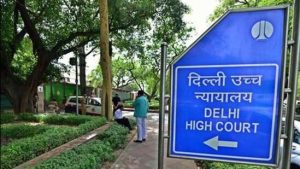New Delhi – The Delhi High Court grants bail to a man who has been languishing in jail since 2018 for allegedly murdering a woman who was later found alive. In a scathing critique of the police investigation, Justice Girish Kathpalia of the Delhi HC grants bail order stated that the investigation “shocks the conscience of this court.”
Case Background: A Murder Mystery Without an Identified Victim

The peculiar case centers around Manjeet Karketta, who was arrested in May 2018 in connection with a murder case registered at Mianwali police station. According to case details, a woman’s dismembered body was recovered in a bag. At the time of discovery, the deceased was identified as one Soni alias Chhoti. However, in a shocking twist, after Karketta’s arrest, Chhoti was found to be alive and well.
Also Read: Bold Waqf Act Provisions Paused by Centre Till May 5 Amid S.C. Scrutiny
“It is a fit case to grant bail as the accused/applicant is in jail since the year 2018, but till date, nobody knows for killing whom,” Karketta’s lawyer argued before the court while seeking the Delhi HC grants bail order. This extraordinary situation – where a man has been imprisoned for over five years for killing someone who remains unidentified – prompted the court’s intervention.
Court’s Sharp Criticism of the Investigation


In the Delhi HC grants bail order, Justice Kathpalia did not mince words when addressing the quality of the police investigation. “To say the least, investigation in this case shocks the conscience of this court,” the judge stated. The criticism extended beyond the immediate investigators to senior police officials as well.
“Not just the investigator, the senior police officers who are supposed to supervise the investigation seem not to have been diligent,” the Delhi HC grants bail order further noted. This stern rebuke highlights serious concerns about the procedural lapses in the criminal justice system that led to Karketta’s prolonged incarceration.
Prosecution’s Arguments Fall Short
The prosecution attempted to maintain its case against Karketta by relying on “last seen” evidence to establish his connection to the murder. This legal doctrine typically involves proving that the accused was the last person seen with the victim before their death.
However, the Delhi HC grants bail judgment decisively rejected this argument. “As regards the ‘last seen’ hypothesis, the said last seen was with Soni @ Chhoti, who has been found to be alive,” Justice Kathpalia observed. This fundamental flaw in the prosecution’s case further justified the court’s decision to grant bail.
Human Rights Implications of the Case
The case raises serious questions about human rights and due process in the criminal justice system. With the Delhi HC grants bail order, the court acknowledged the balance between investigating heinous crimes and protecting individual liberty.
Justice Kathpalia addressed this delicate balance in the Delhi HC grants bail order: “It is extremely saddening that a human being lost life in such a gruesome manner and the body was cut into pieces way back in the year 2018, but till date, even the identity of the deceased has not been established. But merely for that reason, in such circumstances, the accused/applicant cannot be deprived of liberty any further.”
This statement reflects the court’s recognition that while the murder undoubtedly represents a tragic loss of life, continued incarceration without establishing basic facts of the case amounts to an injustice against the accused.
Investigative Failures and Systemic Issues
The Delhi HC grants bail case highlights numerous investigative failures that resulted in Karketta’s prolonged imprisonment. The misidentification of the victim represents perhaps the most glaring error, but the court’s criticism suggests deeper systemic issues in the handling of the case.
The failure to establish the true identity of the murder victim nearly six years after the crime occurred raises questions about the thoroughness of the initial investigation. The Delhi HC grants bail order implies that had proper supervisory mechanisms been in place, these errors might have been identified and addressed much earlier.
Legal Experts Weigh In on the Delhi HC Grants Bail Order


Legal experts point out that the Delhi HC grants bail case represents an extreme example of investigative lapses. “The presumption of innocence is a cornerstone of our legal system,” notes a senior criminal lawyer who did not wish to be named. “When basic facts like the victim’s identity cannot be established, continuing to hold someone in custody becomes increasingly difficult to justify.”
Another legal expert familiar with the Delhi HC grants bail case suggests that expedited trials and regular case reviews could help prevent similar situations. “Regular bail hearings and case status reviews by higher courts could potentially identify such anomalies earlier in the process,” they explained.
Implications for Future Cases
The Delhi HC grants bail order may serve as an important precedent for similar cases where investigations have significant unresolved questions. Legal scholars suggest that the case highlights the need for more robust investigation protocols, particularly in murder cases where victim identification is fundamental.
The Delhi HC grants bail case could potentially influence how courts view prolonged detention in cases with significant evidentiary gaps. While courts typically consider factors like flight risk and tampering with evidence when making bail decisions, this case underscores the importance of also examining the fundamental strength of the prosecution’s case.
Road Ahead for Manjeet Karketta
While the Delhi HC grants bail decision provides Karketta with temporary freedom, his legal battle is far from over. Unless the prosecution drops the charges entirely, he still faces trial for the murder of an unidentified person.
The Delhi HC grants bail order does not constitute an acquittal, but rather acknowledges that continued pre-trial detention is no longer justified given the circumstances of the case. Karketta’s ultimate fate in the legal system remains uncertain, though his prospects have certainly improved with the court’s intervention.
Final Word: Justice Delayed, But Not Entirely Denied
The Delhi HC grants bail case serves as a stark reminder of the potential for miscarriages of justice within the criminal legal system. While the court’s decision cannot restore the years Karketta spent behind bars, it represents an acknowledgment of the system’s failure in this particular case.
As the investigation presumably continues into identifying the actual murder victim, the Delhi HC grants bail order stands as a testament to the court’s role in safeguarding individual liberty against procedural failings. The case will likely be cited in future bail applications where investigations have similar fundamental flaws.

